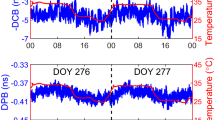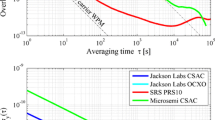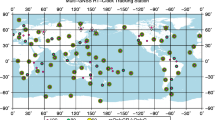Abstract
It is now common to use multiple GNSS constellations (multi-GNSS) for precise positioning. When GPS and BeiDou satellites are used in real-time kinematic GNSS (RTK-GNSS), the normal approach is to construct separate sets of double differences for each satellite constellation. Since QZSS is designed to be the same as GPS in terms of frequency and timing, a QZSS satellite can be used as another GPS satellite for positioning. The normal approach (“normal RTK”) requires one primary satellite for each constellation and thus removes one usable satellite. We developed a mixed GPS + BeiDou model by differencing BeiDou carrier phase and pseudorange observations from those of the primary GPS satellites. This approach introduces inter-system (GPS-to-BeiDou) biases, which must be estimated and removed. In addition, the difference between GPS and BeiDou signal frequencies means that receiver clock error has to be estimated precisely in this approach, and a chip-scale atomic clock (CSAC) was utilized to aid this estimation. The proposed mixed GPS + BeiDou RTK method was evaluated using static data and kinematic data. Kinematic data were collected in both normal and dense urban areas in Tokyo using a small car. The kinematic tests were conducted using an external CSAC as an input to the receiver, which allowed precise estimation of receiver clock error while in motion. The resulting fix rate of mixed GPS + BeiDou RTK-GNSS was approximately 10% better than normal RTK-GNSS.
















Similar content being viewed by others
References
Furuya T, Sakai K, Mandokoro M, Tsuji H, Hatanaka Y, Munenaka H, Kawamoto S (2014) Development of multi-GNSS analysis software GSILIB. J Geospat Inf Auth Jpn 125:125–131
Higuchi M, Kubo N (2016) Achievement of continuous decimeter-level accuracy using low-cost single-frequency receivers in urban environments. In: Proceedings of ION GNSS 2016, Institute of Navigation, Portland, Oregon, 12–16 Sept, pp 1891–1913
Kubo N (2009) Advantage of velocity measurements on instantaneous RTK positioning. GPS Solut 13(4):271–280
Misra P, Enge P (2006) Global positioning system: signals, measurements and performance, 2nd edn. Ganga-Jamuna Press, Lincoln
Montenbruck O, Hauschild A, Hessels U (2011) Characterization of GPS/GIOVE sensor stations in the CONGO network. GPS Solut 15(3):193–205
Odijk D, Teunissen PJG (2013) Characterization of between-receiver GPS-Galileo inter-system biases and their effect on mixed ambiguity resolution. GPS Solut 17(4):521–533
Odolinski R, Teunissen PJG, Odijk D (2015) Combined GPS + BDS for short to long baseline RTK positioning. Meas Sci Technol 26(4):1–16
Teunissen PJG (1995) The least-squares ambiguity decorrelation adjustment: a method for fast GPS integer ambiguity estimation. J Geod 70(1–2):65–82
Teunissen PJG, Joosten P, Odijk D (1999) The reliability of GPS ambiguity resolution. GPS Solut 2(3):63–69
Teunissen PJG, Odolinski R, Odijk D (2014) Instantaneous BeiDou + GPS RTK positioning with high cut-off elevation angles. J Geod 88(4):335–350
Tokura H, Kubo N (2017) Study on inter-system biases estimation for combined GPS-BeiDou RTK-GNSS. Inst Electron Inf Commun Eng B 100(3):291–299
Verhagen S, Teunissen PJG (2013) The ratio test for future GNSS ambiguity resolution. GPS Solut 17(4):535–548
Yamada H, Takasu T, Kubo N, Yasuda A (2011) Evaluation of positioning performance for RTK-GPS/GLONASS with calibrated inter-channel hardware biases. Trans Navig 124:103–110
Yamada H, Takasu T, Sakai T, Kubo N, Yasuda A (2013) Calibration of inter-channel biases on GLONASS signals. Inst Electron Inf Commun Eng B 96(7):793–801
Author information
Authors and Affiliations
Corresponding author
Rights and permissions
About this article
Cite this article
Kubo, N., Tokura, H. & Pullen, S. Mixed GPS–BeiDou RTK with inter-systems bias estimation aided by CSAC. GPS Solut 22, 5 (2018). https://doi.org/10.1007/s10291-017-0670-1
Received:
Accepted:
Published:
DOI: https://doi.org/10.1007/s10291-017-0670-1




